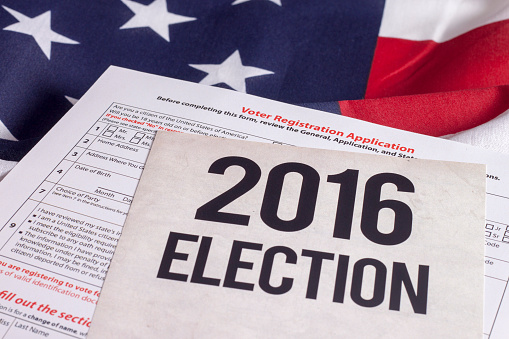
©danielfela/ISTOCK/THINKSTOCK
A recent (Aug. 11 - 14) Bloomberg/Morning Consult poll of 2,001 registered voters, including 880 investors, found 70 percent believed the country was on the wrong track (although they split evenly on the President’s job approval)1. The self-identified investors split almost evenly (49 percent to 51 percent) between those with more and less than $50,000 in investments. The investors were fairly evenly split on whether Trump or Clinton would be best for their investment portfolios (42 v. 40 percent).
Furthermore, when asked if they would change their portfolio positions depending on who was elected, 32 percent of investors said yes if Trump was elected, while 27 percent would change their portfolios if Clinton won.
When asked how they would specifically change their portfolios, the investors responded as follows:
| If President is: |
Trump (277 investors) |
Clinton (239 investors) |
| Increase cash |
40% |
45% |
| Decrease US Equities |
50% |
54% |
| Decrease Gov’t Bonds |
52% |
57% |
| Decrease Corp. Bonds |
47% |
52% |
| Increase Gold |
37% |
49% |
| Decrease Int’l Equities |
45% |
46% |
It is noteworthy a majority of investors who would change their portfolio positions indicated they would reduce domestic equities in either election scenario, despite the fact that 59 percent of all respondents believed the stock market would be higher or about the same in a year, and only 14 percent thought it would be lower. It is fairly clear that on balance most of these investors intend to take risk mitigating actions in response to either candidate’s election.
Another set of questions is worth reviewing. When the entire sample was asked if they thought the economy would enter a recession in the next four years, 47 percent thought it was very or somewhat likely and only 27 percent thought it very or somewhat unlikely.
Asked who would be better at dealing with a recession, 41 percent thought Trump would be, while 39 percent concluded Clinton would be the better economic manager. Interestingly, 49 percent of the total sample would support Bill Clinton advising Hillary Clinton on the economy, while 34 percent would oppose such an arrangement.
An earlier survey of 2,344 investors, conducted as part of the UBS Wealth Management Americas quarterly surveys, focused on investor perceptions of the country and the importance of the election, as well as the impact of the outcome on the stock market and investor responses.2
The UBS survey, conducted in June 2016, included affluent and high net worth investors, (i.e. having more than $1 million and $5 million in investable assets). Respondents, ages 30-36, were included if they had at least $250,000 in investable assets, while respondents ages 21 – 29 were included if they had $100,000 in household income or $100,000 in investable assets. Roughly 25 percent of those surveyed were millennials.
The sample split fairly evenly along party lines, 27 percent identified as Democrats, 34 percent Republicans and 31 percent Independents. Within each affiliation, Baby Boomers and the WWII Generation leaned slightly towards the Republicans (34 and 36 percent respectively), while Millennials were largely Democrats (39 percent) and under represented among Republicans (29 percent) and Independents (23 percent).
This group strongly believed the election would have a direct impact on their financial well-being (80 percent); fully 57 percent said they were considering portfolio changes in response to the election (another 10 percent said they had already made such changes). Because of the election, 47 percent said they were considering reducing their investments in the stock market (9 percent already had) and 25 percent were considering pulling out entirely (5 percent had already done so).
The group also believed that the impact of the election on the stock market depends on which candidate wins. Sixty-one percent believed the market’s reaction would be positive if their candidate won, while 64 percent thought the impact would be negative if the other candidate won.
Both surveys indicate investors are voting in this election very much like the rest of the electorate. So how are financial professionals aligned? There appears to be no recent surveys of bankers and brokers that reveal their political preferences, or their expectations with respect to the election’s impact on financial markets. However, there is one potent indicator that might be an appropriate proxy for their perspectives.
In this election cycle (as of August 22, 2016), Securities and Investment Industry contributors have given $6.4 million to Hillary Clinton and $330,000 to Donald Trump. Commercial Banking Industry contributors have given $1.6 million to Clinton and $70,000 to Trump. Hedge fund managers have provided $616,000 to Clinton and $17,000 to Trump.3
In contrast, during the 2012 election cycle, Securities and Investment Industry contributors gave $23.8 million to Mitt Romney and $7.1 million to Barack Obama, Commercial Banking Industry contributors sent $4.9 million to Romney and $1.7 million to Obama, while hedge fund managers provided $2 million to Romney and $517,000 to Obama.
The contribution levels of Wall Street suggest much less enthusiasm for either candidate in the current presidential race than in 2012. However, it also shows an overwhelming and unprecedented shift to the Democratic candidate. The UBS survey indicated that only 20 percent of investors discussed the impact of the elections on their portfolio with their financial advisers. Perhaps more should do so.
1 Bloomberg/Morning Consult poll, “Survey on Investment”, survey conducted August 11-14.
2 UBS Investor Watch for Q3 2016, ”Electing the Economy”, UBS Wealth Management, survey conducted June 6-14, 2016.
3 Center for Responsive Politics, OpenSecrets.org., Influence and Lobbying, the Finance/Insurance/Real Estate Sector.